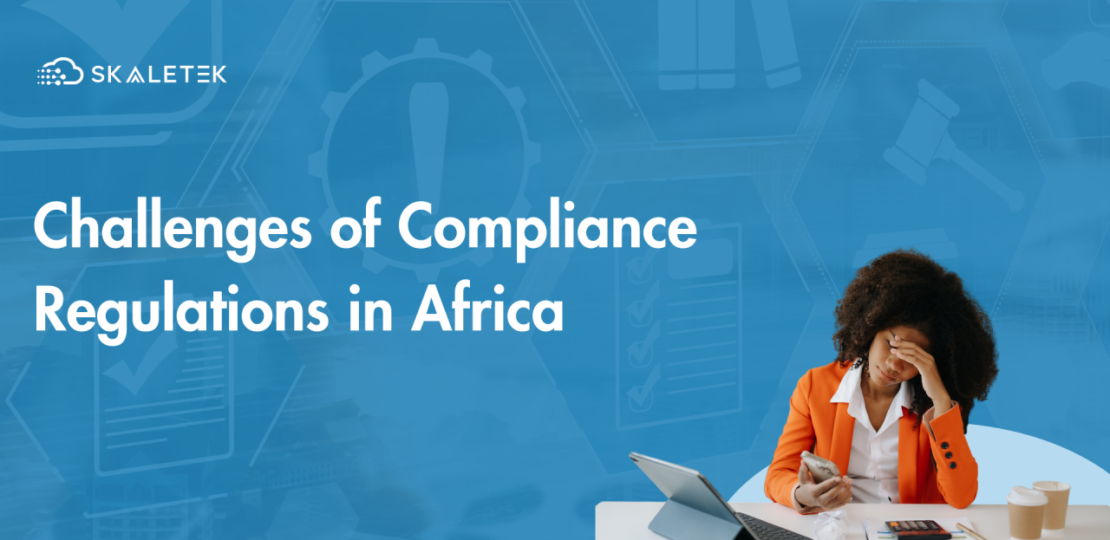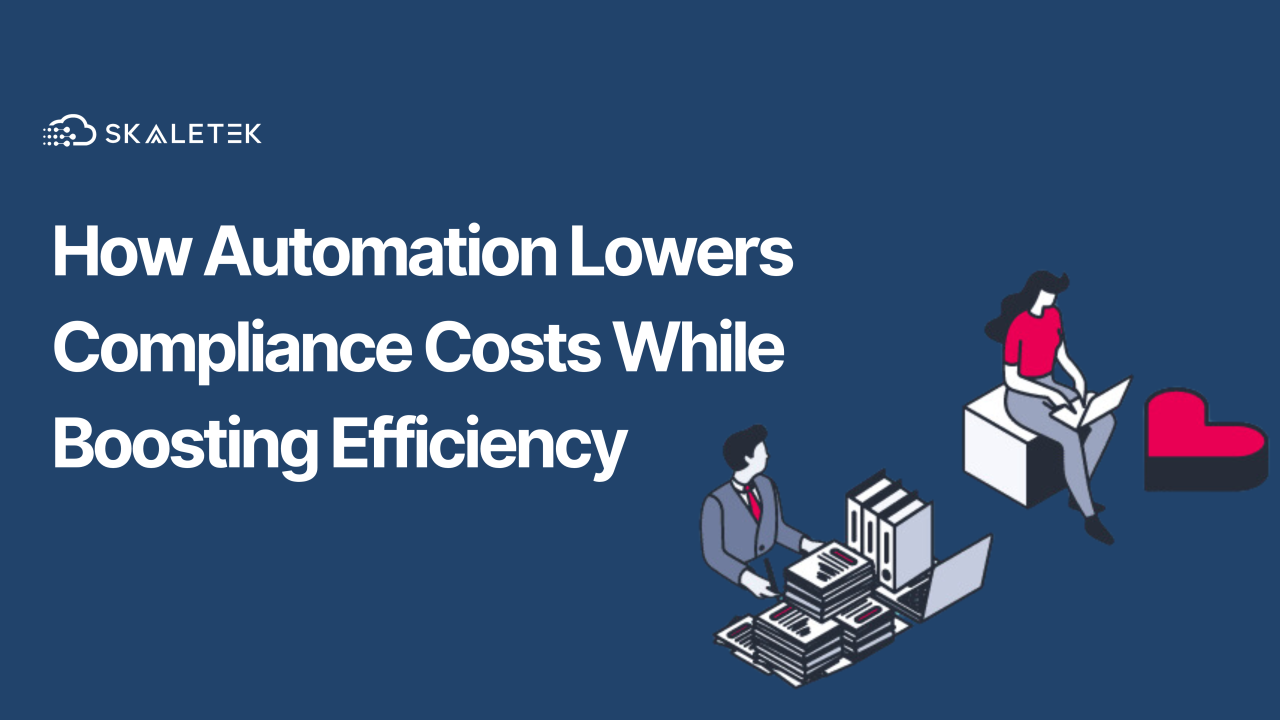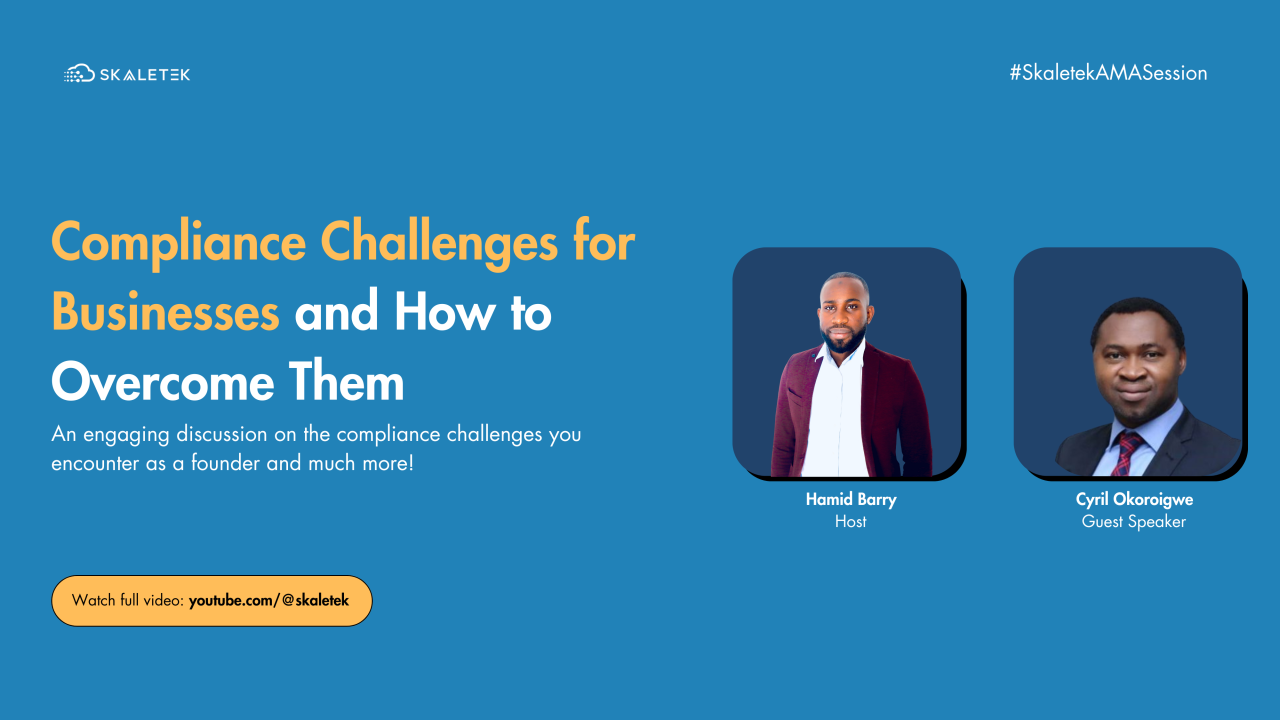How to Scale Your Startup with Strong Risk Management: Insights from Skaletek’s AMA
December 5, 2024 | by whytecreatives@gmail.com

Compliance is often viewed as a burden, but what if it could be a competitive advantage? This was the key message from our recent AMA on Compliance Challenges for Businesses. Hamid Barry, our Founder, and Cyril Okoroigwe, CEO of Regtech Africa, delved into the common hurdles businesses face and offered actionable solutions to turn these challenges into opportunities for growth.
Cyril made it clear that compliance should not be seen as an obstacle. “Compliance isn’t a burden—it’s a way to protect and grow your business,” he stressed. This mindset is critical for any business leader. Rather than viewing compliance as merely meeting regulatory requirements, Cyril encouraged businesses to see it as a foundation that builds trust, reduces risk, and drives success.
Below, we explore the top compliance challenges businesses face and how to turn them into opportunities.
Let’s dive in:
1. Lack of Resources
Cyril opened by addressing one of the most pressing issues for startups: resource limitations. Many small businesses lack the personnel, time, or funds to dedicate to compliance, making it difficult to stay on top of regulations.
He explained that the key is prioritization. “Businesses must prioritize compliance early on by using affordable cloud-based solutions. Automation can reduce the manual burden and free up resources to focus on growth,” he stated. In this way, startups can ensure compliance without overextending their limited resources.
2. Complex and Changing Regulations
Navigating the complexities of ever-evolving regulations is another major challenge for businesses. Compliance isn’t static—rules change frequently, making it difficult for companies to stay updated.
“Regulations are fluid, and without the right expertise, businesses can easily fall behind,” Cyril warned. He emphasized the importance of having dedicated compliance teams or working with external consultants to stay current with regulatory changes. This proactive approach not only helps businesses avoid penalties but also keeps them ahead of the curve. “Think of compliance as your defense against unexpected legal issues,” he added.
3. Inadequate Compliance Infrastructure
Businesses without proper infrastructure in place—meaning policies, procedures, and systems—risk falling into non-compliance. This issue often arises as companies scale, and their initial systems can no longer handle growing demands.
“A robust compliance infrastructure isn’t just about having policies in place—it’s about ensuring they are adaptable as your business grows,” Cyril advised. He explained that scalable systems allow companies to adjust their compliance efforts as they expand, preventing costly mistakes that could have long-term repercussions.
4. Lack of Knowledge and Understanding of Regulations
Cyril also discussed how a lack of regulatory knowledge can lead to unintentional non-compliance. Many businesses, especially in fast-paced industries, struggle to keep up with the evolving rules that govern their operations.
“Compliance isn’t something you can afford to ‘figure out later,’” Cyril emphasized. He suggested continuous education and training for all staff involved in compliance. “Regular training ensures your team knows how to implement the latest standards and regulations, reducing the risk of violations,” he added.
5. Cybersecurity as a Compliance Issue
In today’s digital age, cybersecurity and compliance are deeply intertwined. A data breach or cyberattack can quickly lead to non-compliance with regulations such as GDPR or CCPA.
“Cybersecurity is critical to compliance because protecting customer data is at the heart of many regulations,” Cyril explained. He recommended that businesses invest in cybersecurity measures such as firewalls, encryption, and regular staff training. “By securing your systems, you not only protect data but also avoid the penalties that come with breaches,” he noted.
6. Why Compliance is an Advantage, Not a Burden
Perhaps the most impactful takeaway from the AMA was Cyril’s perspective on viewing compliance as a strategic tool rather than a burden. “When businesses embrace compliance, they don’t just avoid penalties—they gain trust from customers, investors, and partners,” he explained.
Cyril also pointed out that in highly regulated industries, companies with strong compliance frameworks often outperform competitors. “Compliance gives you a competitive edge. It shows you’re serious about operating ethically and protecting your customers,” he added.
Conclusion: Embracing Compliance with Technology
The conversation concluded with both Hamid and Cyril emphasizing the role of technology in simplifying compliance. “Technology is the future of compliance,” Hamid stated. “Automating processes reduces human error, saves time, and ensures accuracy.”
Cyril agreed, adding that “cloud-based solutions and AI-powered systems can make compliance more manageable, especially for businesses that are scaling rapidly.” With the right tools in place, compliance becomes a seamless part of business operations rather than a hurdle.
Next Steps: How Skaletek Can Help
If your business is ready to turn compliance challenges into opportunities, Skaletek offers tailored solutions that simplify the process. “Our goal is to make compliance not only manageable but also a growth driver for your business,” Hamid said.
Skaletek makes compliance simple by automating processes like risk management, document verification, and fraud prevention. Our platform helps you stay up-to-date with changing regulations, minimize human error, and ensure your business is always compliant. With Skaletek, you get peace of mind knowing your operations are secure, allowing you to focus on growth.
Book a demo today to see how Skaletek can help you streamline your compliance processes and stay ahead in a complex regulatory environment.
RELATED POSTS
View all

